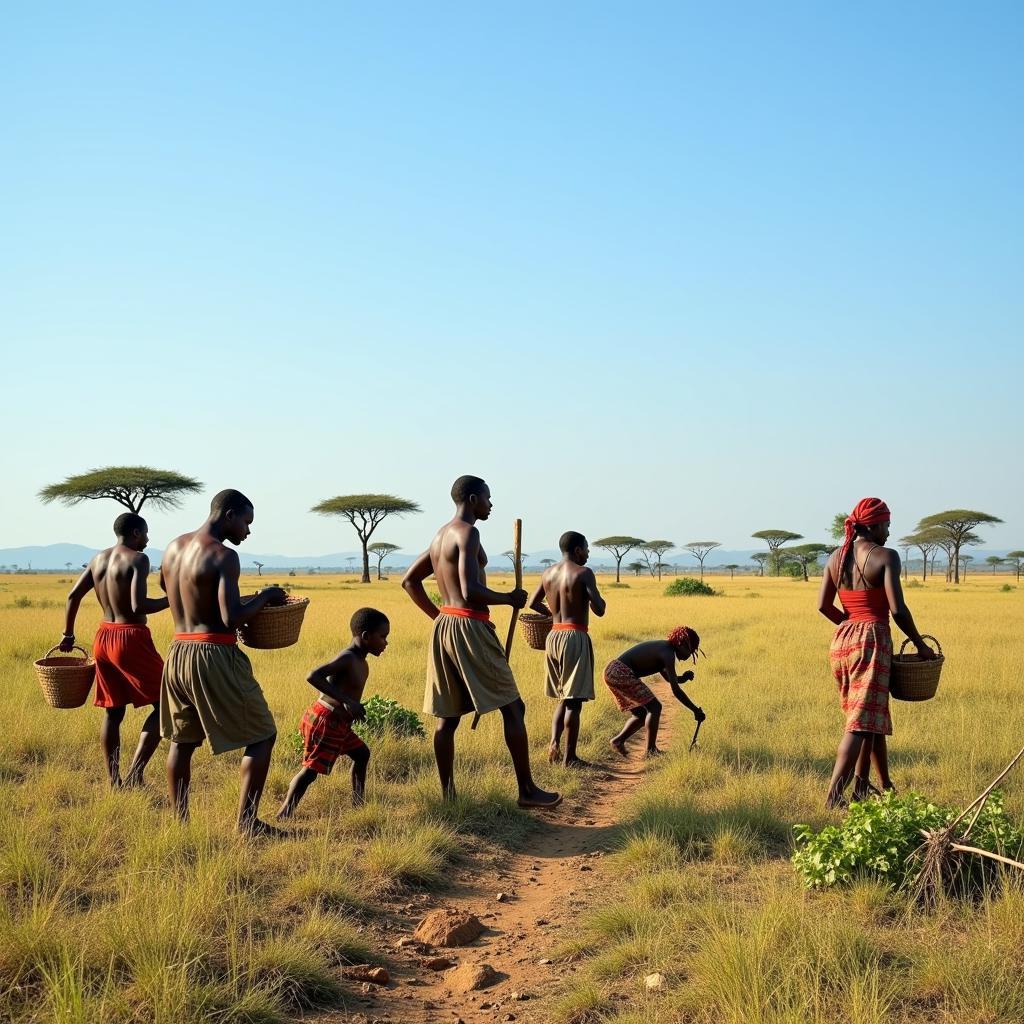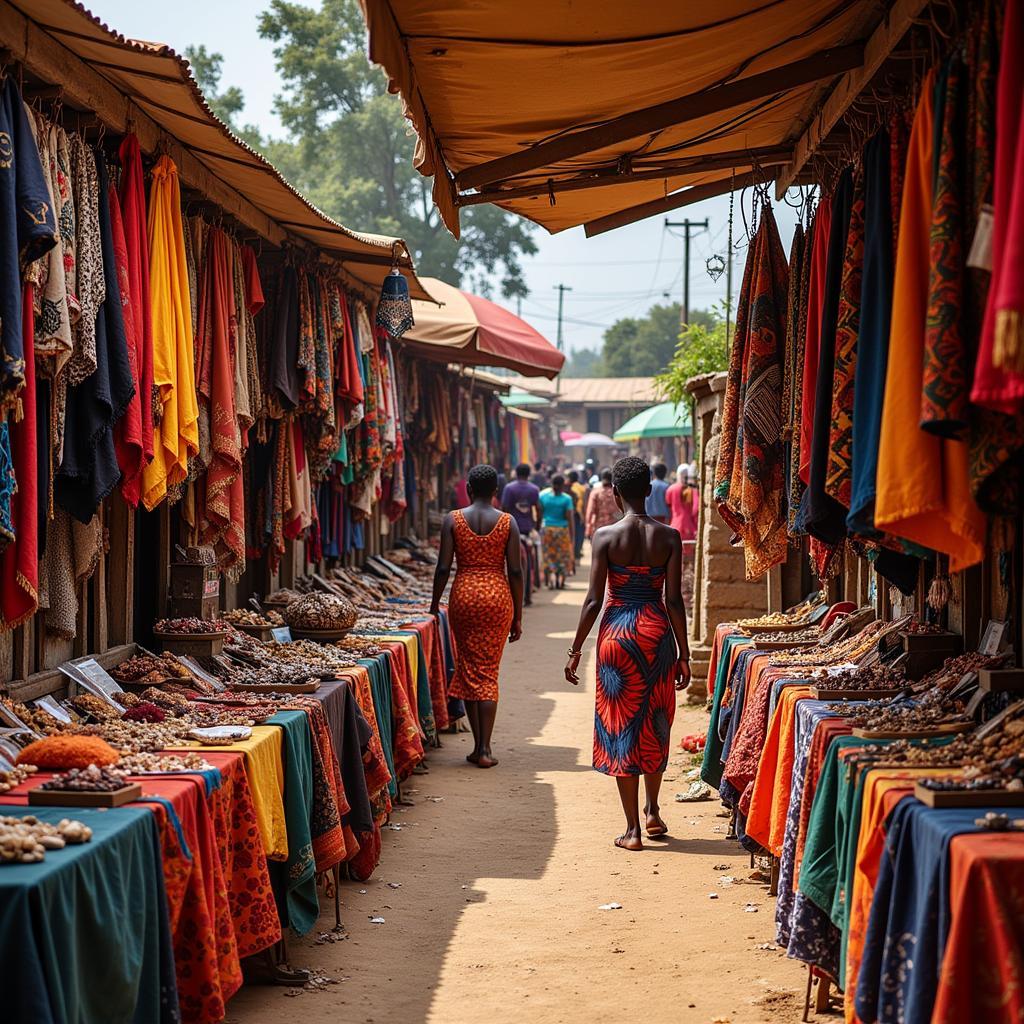The African Hunter-Gatherer Diet: A Deep Dive
The African hunter-gatherer diet, a topic of increasing interest, offers a fascinating glimpse into our ancestral past and provides valuable insights into healthy eating. This article explores the diverse foods, nutritional benefits, and cultural significance of this traditional way of life.
 Hunter-gatherers foraging for food in the African savanna
Hunter-gatherers foraging for food in the African savanna
Understanding the African Hunter-Gatherer Diet
Hunter-gatherer societies in Africa, like the african aka tribe, showcase a remarkable adaptability and deep understanding of their environment. Their diet, far from being monotonous, encompasses a wide range of foods, including wild game, fish, fruits, vegetables, nuts, seeds, honey, and insects. This diversity ensures a balanced intake of essential nutrients. Foraging for food was a way of life, requiring intimate knowledge of the local flora and fauna.
What did African hunter-gatherers eat? They consumed a variety of wild game, fish, fruits, vegetables, nuts, seeds, and insects.
Nutritional Benefits of a Hunter-Gatherer Diet
The nutritional profile of the hunter-gatherer diet is often compared to modern diets, highlighting its potential health benefits. Rich in lean protein, fiber, and healthy fats, while being low in processed foods and refined sugars, this dietary approach resonates with contemporary health trends. Studies suggest that such a diet can contribute to lower rates of chronic diseases like heart disease, type 2 diabetes, and certain cancers.
How nutritious is the hunter-gatherer diet? It’s packed with lean protein, fiber, and healthy fats, promoting optimal health and potentially reducing the risk of chronic diseases.
Regional Variations in Hunter-Gatherer Diets
Across the vast African continent, the specific foods consumed by hunter-gatherers varied significantly depending on geographical location and seasonal availability. For example, groups living near coastal regions relied heavily on seafood, while those in inland areas focused on land-based animals and plants. This adaptability allowed them to thrive in diverse environments, from the arid Kalahari Desert to the lush Congo Basin. The african bow and arrow was a vital tool for hunting in many regions.
Did all African hunter-gatherers eat the same foods? No, regional variations existed, with diets influenced by geographical location and seasonal availability of resources.
The Cultural Significance of Food in Hunter-Gatherer Societies
Food played a central role in the social and spiritual life of African hunter-gatherer communities. Sharing food was a fundamental aspect of their social fabric, strengthening bonds and promoting cooperation. Certain foods held symbolic meaning and were used in rituals and ceremonies, connecting them to their ancestors and the natural world. Understanding the cultural context of food provides a richer understanding of these societies.
What was the role of food in hunter-gatherer culture? It was central to social and spiritual life, symbolizing community, connection to ancestors, and respect for nature.
The Transition from Hunter-Gatherer Lifestyles
As agricultural practices emerged, many hunter-gatherer groups transitioned to settled lifestyles, leading to significant changes in their diets and social structures. This transition had both positive and negative impacts, including increased food security but also a greater susceptibility to infectious diseases. Studying these transitions provides insights into the complex interplay between diet, culture, and human evolution. The african h ergaster provides a fascinating glimpse into our evolutionary past. Many african jungle people have maintained traditional ways of life.
What happened to hunter-gatherer societies with the rise of agriculture? Many transitioned to settled agricultural lifestyles, impacting their diets and social structures significantly.
Conclusion: Learning from the Past
The African hunter-gatherer diet provides a valuable lens through which we can examine our own dietary habits and consider the long-term implications for our health and well-being. By understanding the principles of this ancient way of eating, we can gain insights into creating more sustainable and healthy food systems for the future. The African hunter-gatherer diet offers more than just a historical perspective; it offers a roadmap to a healthier future.
FAQ
- What is the typical lifespan of an African hunter-gatherer?
- What were the main challenges faced by hunter-gatherers?
- How did hunter-gatherers preserve food?
- Did hunter-gatherers have any concept of ownership?
- How did climate change impact hunter-gatherer societies?
- What tools did African hunter-gatherers use for hunting and gathering?
- How did hunter-gatherers communicate with each other?
Need help? Contact us 24/7: Phone: +255768904061, Email: kaka.mag@gmail.com, Address: Mbarali DC Mawindi, Kangaga, Tanzania.
